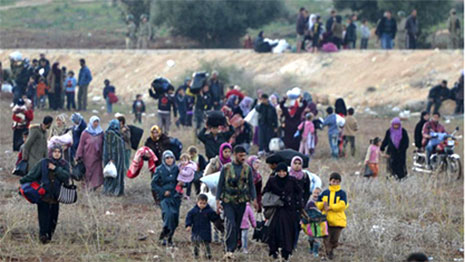The conflict in Syria began in March 2011 when the Syrian Government violently repressed protests against the regime that had erupted as part of the Arab Spring. When Australia took up its seat in January 2013, the conflict was escalating, with the rising human costs of the conflict having a disproportionately severe impact on women and children. Yet the Council was deadlocked on Syria following the use of the veto to block resolutions on Syria in October 2011, February 2012 and July 2012.
Australia determinedly pushed the Council towards unified action to address the humanitarian crisis in Syria. In Australia's view, the Council needed to overcome its divisions on Syria and act - too many civilians were being killed and injured, particularly at the hands of the Syrian military, for it to remain silent. Given the deadlock, Australia took the lead in April 2013 in producing the first statement by the Council in 15 months on Syria in the form of Press Elements.
In August 2013, the use of chemical weapons by the Syrian regime in the suburbs of Damascus shocked the world. Given the stalemate over Syria, there was a real possibility force would be used against the Assad regime outside the authority of the Council. Under Australia's Presidency in September 2013, this potential moment of crisis was averted when the Council reached agreement on a plan developed by the United States and the Russian Federation to eliminate Syria's chemical weapons under UN supervision, codified in UNSC Resolution 2118. Australia remained vigilant in monitoring implementation of this agreement during our Council term. As of December 2014, ninety-eight per cent of the regime's stockpile has been destroyed – a significant achievement for the Council – although there remains a need for attention on accountability and the ongoing use of chlorine as a weapon against Syrian civilians, in violation of Resolution 2118.
Off the back of the Council's cooperation on chemical weapons, Australia worked with like-mindeds to arrange for the Council to be regularly briefed on the humanitarian and human rights dimensions of the conflict, including its devastating impact on Syrian women and children. This led to a series of agreements on the need for enhanced humanitarian access and better protection of civilians, including a Presidential Statement adopted in October 2013 and Resolutions 2139, 2165 and 2191 adopted in 2014, following negotiations led by Australia, Luxembourg and Jordan.
UNSC Resolution 2165 enabled UN agencies to deliver humanitarian assistance across borders without the consent of the Syrian authorities – the first resolution of its kind. The extension of this mandate to the end of 2015 has provided the UN system with the means to respond more effectively to the world's worst humanitarian crisis and helped reduce the suffering of the Syrian people. Sadly, much more needs to be done to assist the people of Syria.
Find out more:


